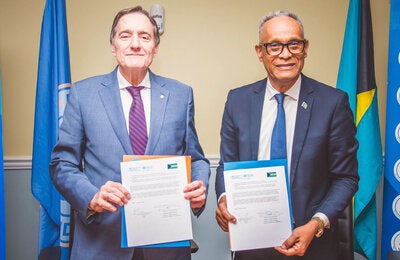Washington D.C., 12 January 2011 (PAHO)—In the face of unprecedented health challenges during 2010, Haiti's health workers were "heroes" whose untiring efforts saved lives and reduced the suffering of thousands of injured and ill, said Dr. Mirta Roses, Director of the Pan American Health Organization/World Health Organization (PAHO/WHO), in remarks today, one year after the Jan. 12, 2010, earthquake.
Health workers, including the authorities at all levels, were personally affected by the disaster, including some 300 who died during the quake," Dr. Roses recalled. "Other health workers lost family members and friends and saw their homes and workplaces destroyed or damaged. In spite of these challenges, Haiti's doctors, nurses, laboratory technicians and other health workers, including staff of the Pan American Health Organization, were in the forefront of rescue efforts. In the aftermath of the earthquake they carried on, often working for days on end without sleep, and for weeks on end without a break.
These health workers "are an inspiration," said Dr. Roses, and "the source of hope for the future strengthening of a public health system in Haiti that will make 'health for all' a reality for the Haitian people.
Haiti's 2010 earthquake claimed more than 200,000 lives, injured many thousands more, and devastated the country's transportation, housing, water, and sanitation infrastructure.
In the health sector, casualties of the quake included the headquarters building of the Ministry of Health, over 200 ministry staff working there, and 30 hospitals that were destroyed or seriously damaged in the three regions most affected by the quake.
Ten months later, an outbreak of cholera in the country's north spread quickly to all 10 departments of Haiti. The most recent reports indicate a cumulative 181,829 cholera cases nationwide and 3,759 deaths since October 2010.
International agencies and nongovernmental organizations have provided invaluable support for Haiti's response to both the earthquake and the cholera epidemic. But it is Haiti's own health workers, said Dr. Roses, who have been in the forefront providing medical care for earthquake and cholera victims as well as educating the public about prevention and the need for early treatment of cholera symptoms.
They have led the fight against cholera as well as efforts to reduce maternal and infant mortality, prevent HIV, and address other ordinary daily health needs," Dr. Roses noted.
Officials of Haiti's Ministry of Health have provided crucial leadership, despite the destruction of their headquarters and the loss of key personnel. After the earthquake, health officials developed and began implementing a strategy to rebuild the country's health system, including rebuilding 30 hospitals in the three departments most heavily affected by the earthquake as well as guaranteeing free health care to the country's most vulnerable groups.
Since the start of the cholera epidemic, and despite a lack of experience with the disease, Haiti's health officials, healthcare providers, and community health workers-with support from U.N. agencies and international nongovernmental organizations-have gradually improved case management and reduced the case fatality rate from a high of 9 percent to an average 2.1 percent nationwide.
In both the aftermath of the earthquake and the ongoing cholera epidemic, a key challenge has been coordinating the more than 400 organizations and agencies participating in the health response to both emergencies. PAHO/WHO has worked closely with the Ministry of Health to coordinate these partners and to ensure the effective and efficient deployment of staff and supplies.
In addition to addressing the acute healthcare needs created by earthquake and the cholera epidemic, the Ministry of Health and its partners in the Health Cluster have managed to restart programs for outbreak control and environmental health, immunization, maternal and neonatal health, nutrition, gender-based violence, HIV, tuberculosis, malaria, dengue, mental health, and rehabilitation services for disabled people.
In addition to Dr. Roses' remarks, PAHO also marked the first year after the 2010 Haiti earthquake with a candlelight remembrance and a minute of silence. In Haiti, commemorative events have included a mass at the ground of the Port-au-Prince cathedral and other memorial services, an opening of the National Archives' Register of Deceased and Missing Persons from Jan. 12, 2010, special radio and TV programs, and a soccer game between two teams of amputees. In addition, the United Nations' mission in Haiti is unveiling a monument in honor of the 96 U.N. staff who perished in the quake.



